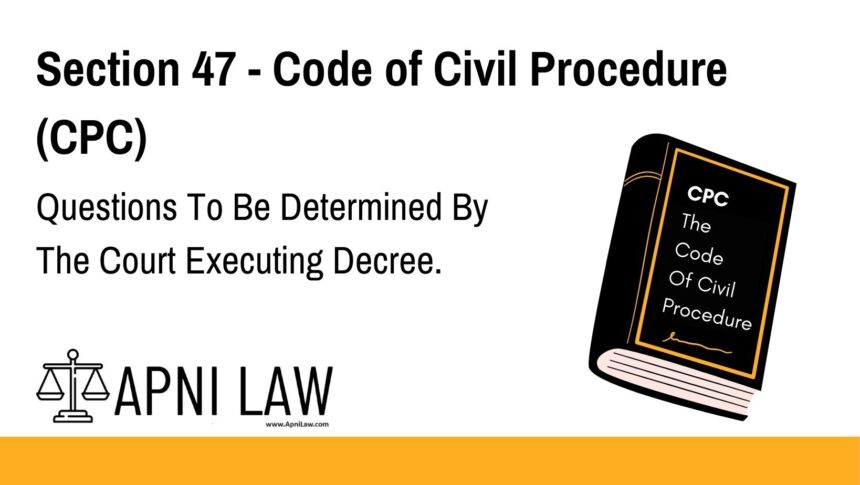Code
CPC(1) All questions arising between
the parties to the suit in which the decree was passed, or their representatives, and relating to the
execution, discharge or satisfaction of the decree, shall be determined by the Court executing the decree
and not by a separate suit.1*****(3) Where a question arises as to whether any person is or is not the representative of a party, such
question shall, for the purposes of this section, be determined by the Court.2[Explanation1.– For the purposes of this section, a plaintiff whose suit has been dismissed and a
defendant against whom a suit has been dismissed are parties to the suit.Explanation II.– (a) For the purposes of this section, a purchaser of property at a sale in execution of a
decree shall be deemed to be a party to the suit in which the decree is passed; and(b) all questions relating to the delivery of possession of such property to such purchaser or his
representative shall be deemed to be questions relating to the execution, discharge or satisfaction of the decree
within the meaning of this section.]
Perfect 👍 You’ve now reached Section 47 CPC – Questions to be determined by the Court executing decree, which is one of the most important and frequently cited provisions in execution proceedings. Let me prepare the structured, SEO-friendly ApniLaw-style article for this section.
Section 47 CPC: Questions to be determined by the Court executing decree
Code
Section 47 – Code of Civil Procedure, 1908
(1) All questions arising between the parties to the suit in which the decree was passed, or their representatives, and relating to the execution, discharge or satisfaction of the decree, shall be determined by the Court executing the decree and not by a separate suit.
(3) Where a question arises as to whether any person is or is not the representative of a party, such question shall, for the purposes of this section, be determined by the Court.
Explanation I – For the purposes of this section, a plaintiff whose suit has been dismissed and a defendant against whom a suit has been dismissed are parties to the suit.
Explanation II –
(a) For the purposes of this section, a purchaser of property at a sale in execution of a decree shall be deemed to be a party to the suit in which the decree is passed; and
(b) All questions relating to the delivery of possession of such property to such purchaser or his representative shall be deemed to be questions relating to the execution, discharge or satisfaction of the decree within the meaning of this section.
📖 Source: Section 47 CPC – Questions to be determined by the Court executing decree (ApniLaw)
Explanation
Section 47 CPC provides that all disputes relating to the execution of a decree must be decided by the executing Court itself, rather than by instituting a separate suit.
Key points:
- Parties to the suit, including their legal representatives, must raise any dispute relating to execution, discharge, or satisfaction of the decree before the executing Court.
- This ensures speedy execution and prevents unnecessary multiplicity of litigation.
- The Court also decides disputes about whether someone is the representative of a party (e.g., heirs, legal successors, assignees).
- Purchasers at auction sales during execution proceedings are treated as parties to the suit for execution-related questions.
Thus, Section 47 aims to make the execution process self-contained and efficient.
Illustrations
- Example 1:
A judgment-debtor claims that the decree has been fully satisfied. This question must be determined by the executing Court, not by filing a fresh civil suit. - Example 2:
A dispute arises whether a legal heir of the judgment-debtor is bound by the decree. This must be decided by the executing Court under Section 47. - Example 3:
An auction-purchaser of property in execution seeks delivery of possession. Any resistance by the judgment-debtor will be decided as a Section 47 question, not through a new suit.
Common Questions and Answers
1. What is the purpose of Section 47 CPC?
It ensures that all disputes related to execution, satisfaction, or discharge of decrees are resolved within execution proceedings themselves, avoiding fresh litigation.
2. Can a separate suit be filed for execution-related disputes?
❌ No. Section 47 expressly bars separate suits for such matters.
3. Who is considered a “party” under Section 47 CPC?
- Original plaintiff/defendant (even if suit dismissed).
- Legal representatives of parties.
- Auction-purchasers during execution.
4. Can the executing Court go beyond the decree?
No. The executing Court can only interpret and enforce the decree; it cannot alter or go behind it.
5. Why is Section 47 frequently litigated?
Because execution often leads to disputes over satisfaction of decree, delivery of property, rights of heirs, and auction-purchasers — all falling under Section 47 CPC.
Conclusion
Section 47 CPC makes execution proceedings comprehensive by ensuring that all disputes regarding the execution, discharge, or satisfaction of decrees are resolved by the executing Court itself.
This avoids delay and multiplicity of suits, thereby protecting the decree-holder’s right to effective enforcement.
👉 Read more: Section 47 CPC – Questions to be determined by the Court executing decree (ApniLaw)








